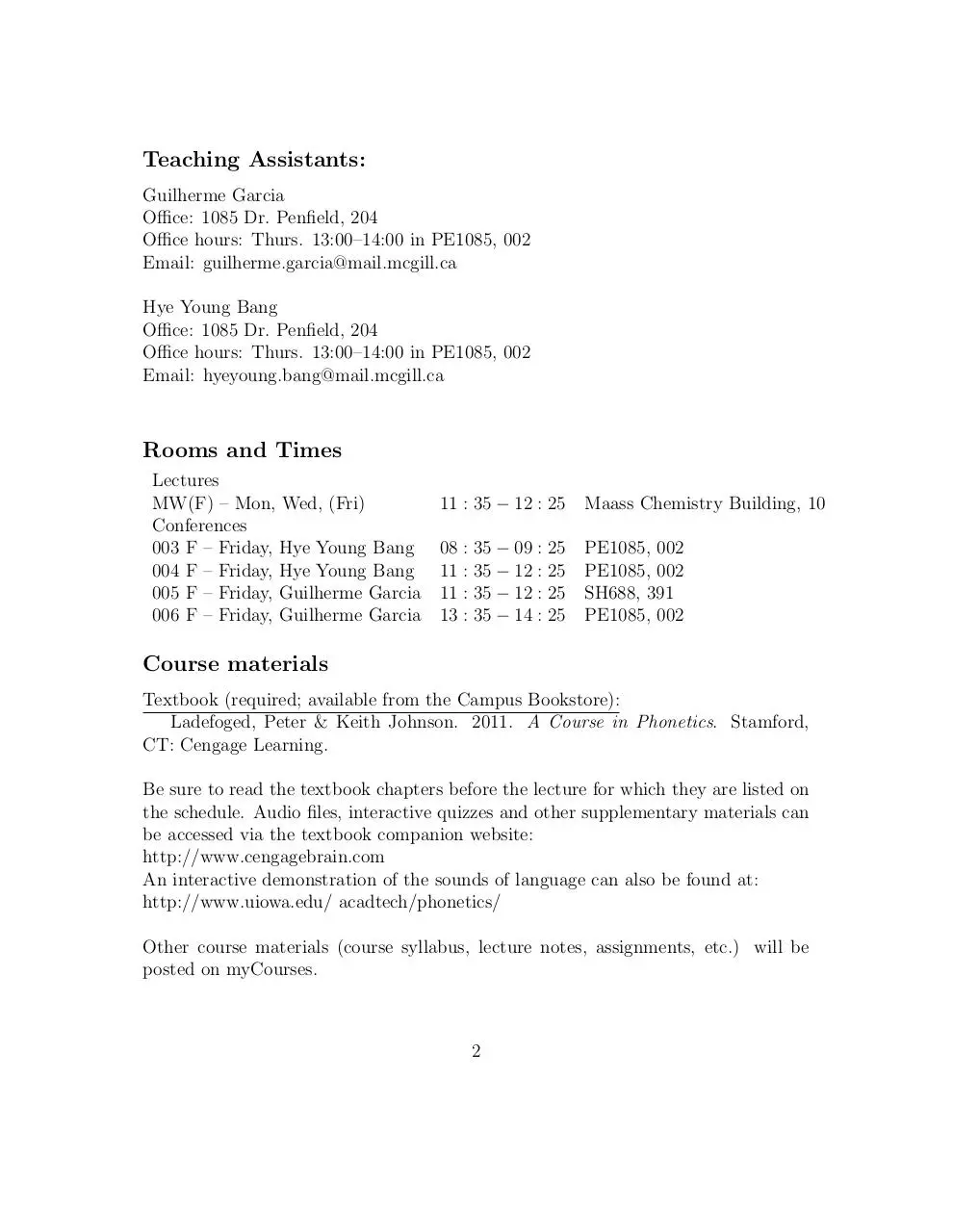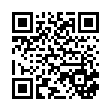Winter 2015 (PDF)
File information
This PDF 1.5 document has been generated by TeX / pdfTeX-1.40.15, and has been sent on pdf-archive.com on 09/06/2017 at 05:20, from IP address 74.15.x.x.
The current document download page has been viewed 468 times.
File size: 89.95 KB (6 pages).
Privacy: public file





File preview
LING 330 Phonetics I: Introduction to phonetics
Course description and objectives
Description of speech sounds; transcription systems; articulation; acoustics of speech
sounds; perception of speech sounds; cross-linguistic diversity and phonetic universals; the role of phonetics in grammar.
Prerequisite(s): LING 201, or permission of the instructor.
Lectures three hours a week.
Specific course objectives:
- Offer the student an opportunity to develop a phonetic analysis through handson experience with data;
- Becoming familiar with articulatory, acoustic and perceptual aspects of speech;
- Learning to classify and transcribe speech sounds used in the world’s languages;
- Learning to generate and to interpret oscillograms and spectrograms;
- Learning about the phonetic grounding of phonological concepts, including
distinctive features.
- Acquire basic research and technical writing skills.
Instructor: Peter Milne
Office: 1085 Dr. Penfield, 121
Office hours: Mon. 9:00–10:00, Wed. 15:00–16:00
Email: peter.milne@mcgill.ca
1
Teaching Assistants:
Guilherme Garcia
Office: 1085 Dr. Penfield, 204
Office hours: Thurs. 13:00–14:00 in PE1085, 002
Email: guilherme.garcia@mail.mcgill.ca
Hye Young Bang
Office: 1085 Dr. Penfield, 204
Office hours: Thurs. 13:00–14:00 in PE1085, 002
Email: hyeyoung.bang@mail.mcgill.ca
Rooms and Times
Lectures
MW(F) – Mon, Wed, (Fri)
11 : 35 − 12 : 25
Conferences
003 F – Friday, Hye Young Bang 08 : 35 − 09 : 25
004 F – Friday, Hye Young Bang 11 : 35 − 12 : 25
005 F – Friday, Guilherme Garcia 11 : 35 − 12 : 25
006 F – Friday, Guilherme Garcia 13 : 35 − 14 : 25
Maass Chemistry Building, 10
PE1085, 002
PE1085, 002
SH688, 391
PE1085, 002
Course materials
Textbook (required; available from the Campus Bookstore):
Ladefoged, Peter & Keith Johnson. 2011. A Course in Phonetics. Stamford,
CT: Cengage Learning.
Be sure to read the textbook chapters before the lecture for which they are listed on
the schedule. Audio files, interactive quizzes and other supplementary materials can
be accessed via the textbook companion website:
http://www.cengagebrain.com
An interactive demonstration of the sounds of language can also be found at:
http://www.uiowa.edu/ acadtech/phonetics/
Other course materials (course syllabus, lecture notes, assignments, etc.) will be
posted on myCourses.
2
Evaluation
The final course grade will be
Quizzes (10)
Homework assignments (8)
Midterm exam
Final exam
based on the following components:
10%
40%
20%
30%
Course rules and procedures
Conferences
Starting in Week 3 (Friday, January 23rd ), Friday sessions will be held as conferences
run by a TA. To determine which conference you will attend, you must sign up on
Minerva. Sign up will be available after the first class. Once you have signed up
for one section, you cannot switch to another. An effort will be made to divide
the students evenly between sections. This means that once a section has a certain
number of students, no more students will be accepted into that section.
You are responsible for the material covered in conferences just as you are responsible for the material covered in lectures. If for some reason you cannot attend
a conference or lecture, you should make sure that you get the relevant notes from a
classmate.
Office hours and appointments
TA office hours will be held regularly before assignments and midterms. Outside of
office hours, students are encouraged to send content-related questions by e-mail to
their TA. If you wish to meet with the TA or the professor outside of scheduled office
hours, you can ask for individual appointments and generally these can be arranged.
Tutors
If you feel that you need more individual attention, we encourage you to contact
either the Student Tutorial Service (398-6011) or SLUM (the undergraduate linguistics student association: slum.linguistics@mail.mcgill.ca). Of course, it is understood
that tutors help with the content of the course but do not help directly with assignments. Make sure that your tutor knows what is being covered in the course this
term since the content can change from term to term.
3
You can expect TAs and professors to respond to your e-mail questions and comments. However, please do not expect instant responses. We will try to respond
quickly (though we will be more vigilant closer to assignment due dates and exam
times). Students often find that the discussions on the MyCourses website helpful.
Homework assignments
Assignments may be done alone or in groups. A group may contain a maximum of
three students and all group members must be from the same conference. A group
may hand in a single assignment with all group members’ names and student
numbers on it – all group members will receive the same grade for the assignment.
You are not required to work in a group – you may hand in an assignment alone
if you wish.
Midterm exam
The midterm exam is scheduled for TBD. It will take place in TBA. A make-up
midterm will be arranged only for students who have a conflict with the midterm as
scheduled. To be eligible, students must be registered in a conflicting course with
a higher priority than LING 330. Students who qualify must let me (Peter
Milne) know in writing no later than Tuesday, January 27th , one week
after the add/drop deadline.
Rules regarding assignments, quizzes and exams
No make-up assignments, quizzes or midterm exam will be given to anyone who does
not have a certified medical excuse. We must be notified within 24 hours of a missed
assignment, quiz or midterm exam. You may leave messages at (514) 398-4222, even
on weekends. According to Senate regulations, instructors are not permitted to make
special arrangements for final exams. Please consult the Calendar, section 3.7, General University Information and Regulations. (See http://www.mcgill.ca/studentrecords/exam/regulations for more information on final and deferred exams.)
Any problem with grading on an assignment/quiz/exam must be reported within
one week of when the assignment, quiz, or exam was returned. No answer to any
graded assignment, quiz or exam question will be re-assessed unless the answer was
originally written in ink and it has not been written over.
We recommend that you always keep a copy of your finished assignment in case
the assignment is accidentally lost.
4
Academic integrity
McGill University values academic integrity. Therefore, all students must understand
the meaning and consequences of cheating, plagiarism and other academic offences
under the code of student conduct and disciplinary procedures
(see www.mcgill.ca/students/srr/honest/ for more information).
L’universit´e McGill attache une haute importance `a l’honnˆetet´e acad`emique.
Il incombe par cons´equent `a tous les ´etudiants de comprendre ce que l’on entend
par tricherie, plagiat et autres infractions acad`emiques, ainsi que les cons`equences
que peuvent avoir de telles actions, selon le Code de conduite de l’`etudiant et des
proc´edures disciplinaires (pour de plus amples renseignements, veuillez consulter le
site www.mcgill.ca/students/srr/honest/ ).
Right to submit in French
In accord with McGill University’s Charter of Students Rights, students in this course
have the right to submit in English or in French any written work that is to be graded.
Conform´ement `a la Charte des droits de l´etudiant de l’Universit´e McGill, chaque
´etudiant a le droit de soumettre en franais ou en anglais tout travail ´ecrit devant ˆetre
not´e (sauf dans le cas des cours dont l’un des objets est la maˆıtrise d’une langue).
Copyright: Instructor-generated course materials
Instructor-generated course materials (e.g., slides, handouts, conference materials,
assignments, quizzes, exam questions, answer keys, etc.) are protected by law and
may not be copied or distributed in any form or in any medium without explicit
permission of the instructor. Note that infringements of copyright can be subject
to follow up by the University under the Code of Student Conduct and Disciplinary
Procedures.
5
Course Content
00
01
02
03
04
05
06
07
08
09
10
11
12
Topic
Introduction
Articulation & Acoustics
Phonology & Phonetic Transcriptions
Consonants of English
English Vowels
English Words & Sentences
Airstream Mechanisms
Consonantal Gestures
Acoustic Phonetics
Vowel-Like Articulations
Suprasegmentals
Speech Perception
Phonetics in Phonology
6
Reading(s)
Homework
Ch. 1
Ch. 2
Ch. 3
Ch. 4
Ch. 5
Ch. 6
Ch. 7
Ch. 8
Ch. 9
Ch. 10
TBD
TBD
1
2
3
4
5
6
(Recording)
(Transcription)
(Consonants)
(Vowel Plot)
(Pitch)
(VOT)
7 (Transitions)
8 (Perception)
Download Winter 2015
Winter 2015.pdf (PDF, 89.95 KB)
Download PDF
Share this file on social networks
Link to this page
Permanent link
Use the permanent link to the download page to share your document on Facebook, Twitter, LinkedIn, or directly with a contact by e-Mail, Messenger, Whatsapp, Line..
Short link
Use the short link to share your document on Twitter or by text message (SMS)
HTML Code
Copy the following HTML code to share your document on a Website or Blog
QR Code to this page

This file has been shared publicly by a user of PDF Archive.
Document ID: 0000609134.